It’s an absolute crime to me that Living Single doesn’t get more love than it does. You walk into Box Lunch, or one of those stores that capitalizes on TV nerd merchandise (I love those stores; they get SO much of my money at holidays and birthdays), and you find t-shirts, mugs, and hats bearing the logos of Friends and Seinfeld. Maybe Living Single merchandise exists somewhere (probably on Redbubble, or one of those fan-run, indie artist sites). But in a corporate store that sells officially licensed merchandise? I’ve never ever seen it. And that’s a crying shame, because the show was so very very good.
Living Single was the brainchild of Yvette Lee Bowser, and ran on Fox from 1993–1998. It starred Queen Latifah, Kim Coles, Kim Fields, and a stunning all-Black cast. I’m told it’s a similar premise to Friends. Never having seen Friends (or having any interest in doing so), I’ll have to take that on faith. Bunch of friends, sharing adventures and misadventures in New York City. Eye candy for days (I had a crush on most of the cast, especially TC Carson and Erika Alexander). I don’t know that there was anything particularly groundbreaking about the stories that it told—but maybe that’s what was so good about it. They were telling stories about these people, living these lives, because they are part of the human race and they are beautiful and interesting and why wouldn’t everyone want to watch a show about them?
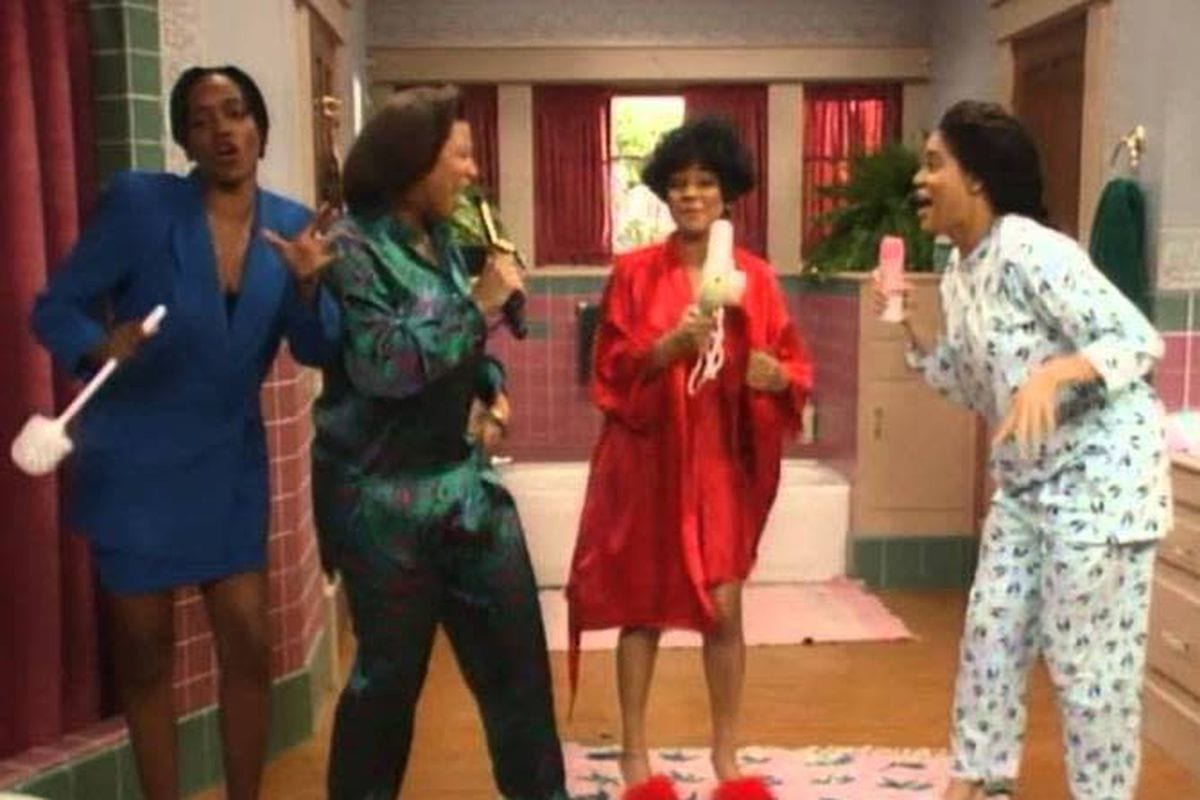
I’m not super large with traditional comedies. With the exception of The Golden Girls, or anything from the brain of His Royal Highness Norman Lear (All In The Family, The Jeffersons, One Day at a Time, so many others), your basic half-hour comedy that everyone else in the world seems to love so much is typically lost on me. Living Single wasn’t a show that went out of its way to make heavy social commentary through a comedic medium, like those other shows I mentioned. Which is fine, because it’s not like it was hardcore fluff either (nothing against hardcore fluff—lots of people love Happy Days, I’m just not one of them). And I don’t really fall into the show’s demographic…aside from the fact that I’m a human being, and these are human stories.
I really don’t want to make this about me, but just so you get where I’m coming from as I write this—I’m not Black, and I never lived with a bunch of girl friends. In fact, at the time, I wasn’t particularly good at having girl friends. I was one of those twentysomethings whose friends were mostly guys. The magic of female friendships hadn’t truly appeared in my life yet (I had the odd girl friend, but I didn’t have a group of “girls” whose company outranked men). My social experience with women growing up hadn’t been the best either—I was horribly bullied in school as a kid, and the girls were the worst. They could be bitchy and vicious and knew exactly what to say to make you cry. This was how the white girls at my school were to me.
Strangely enough, the Black girls were, more often than not, kind. I have no way of knowing if they actually liked me, or what their motivations really were—but they weren’t horrible to me, whereas the girls who looked like me were “mean girls” long before the eponymous movie. So maybe that was part of why Living Single appealed to me. I got to look in the window at this group of women, and I could tell myself that they probably wouldn’t have rejected me either. This was one of my early examples of female camaraderie, before I had a group of “girls” of my own.
One of the things I noticed about Living Single was that, though they did everything they could to build up the Black community in every way, they didn’t need to vilify white people to do it. George Jefferson and his tendency to call everyone a honky would not have fit in with this crowd. And on Living Single, everyone liked each other! Again, I can’t speak to Friends with any real authority, but even fans of the show tell me that much of the humour comes from snark, and the “friends” taking digs at each other (like I said, I haven’t seen Friends myself, but this is a comparison that is always loudly made to me whenever I mention the dynamic to people I know who watch both shows). On Living Single, even when there was feuding (or Max and Kyle’s on and off guttersniping at each other, which was actually extended foreplay), there was always a feeling of warmth in the room. Playful, sure. They’d tease each other. But it was good-natured. It never felt bitchy.
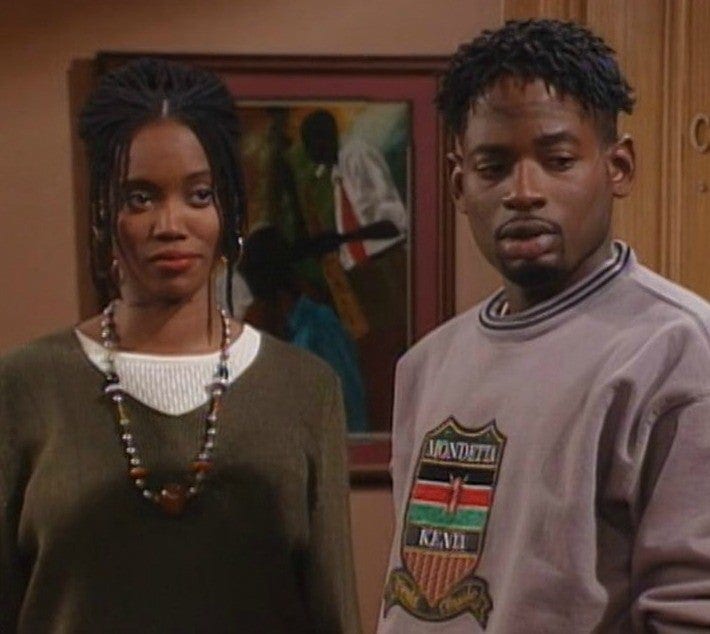
The big challenge for me on how to write an article on this show that I love was how to properly cover it from all sides. I can give my personal take, which I’ve done—but I also don’t want to make it all about me, so I think I’m done doing that. I can wave pom-poms in general about what a great and well-made piece of television it was, which I have been doing, and will keep doing. But there’s no way I can speak for the Black community, for which the show’s relevance was huge and unquestionable. So I enlisted the help of a couple of friends (both actresses, both Black, both gorgeous), who were kind enough to share their perspectives with me.
Paula Galloway: Khadijah is an independent entrepreneur, business woman and journalist. Yes, she was the leader of the group, but she had moments of vulnerability and insecurity like anyone else. She was all about the dignity, but with her girls she had no problem acting a damn fool. Synclaire, oh my gosh—I have always loved Kim Coles, so this was not a surprise that I loved her. She was completely different from the rest of the characters, yet made herself essential. How many times have I comforted a friend with a simple “woo woo woo”? Because it became shorthand for automatic love and support. She was not like any stereotypical Black woman that Hollywood has ever given us before. Sort of a crunchy granola tree-hugger that could hang with the girls in Brooklyn. I wish they would have let her use her accents more often, though. She’s good like that.
Cat: It’s weird how out of all of them Synclaire was the one who took the most time to grow on me. And the reason she finally did grow on me was her comedy. She was always beautiful (even if she wasn’t your type, you couldn’t look at the way Overton looked at her and not find her beautiful), but this was a woman who eventually got to make a living at being funny, and got to be beautiful at the same time. And as women, we have it drummed into our heads early on that we aren’t supposed to do that, or if we are funny, we aren’t supposed to be attractive and funny at the same time. It’s one of the reasons Whoopi Goldberg was one of my heroes back when I was 12.
Paula: Regine was a straight-up bougie diva who, shockingly, has one hell of a character arc from beginning to end. From Episode 1, her goal is simple—marry a rich, fine man and be pampered, forever. A goal she does eventually achieve. Yet to get there, she has to go through a lot of stuff. She finds this man and that man and some self-discovery along the way. My one thing I will never forgive—Kim Fields left the show over producer problems, I think, and we were deprived of the most extravagant, diva-licious wedding ever.
Cat: I had so much respect for Kim Fields for working her breast reduction surgery into the show as something that happened to Regine too. I don’t know what you’d call it, but there always seemed to me to be an honesty that these women had about their bodies that I’ve envied. Maybe it’s a cultural thing, maybe it’s just me. I do know that the last time I saw a sitcom made up of women with curves like that, who happened to be white, it was Babes, and the whole gimmick was that they were “plus-sized.” On Living Single, “plus-sized” wasn’t a thing.
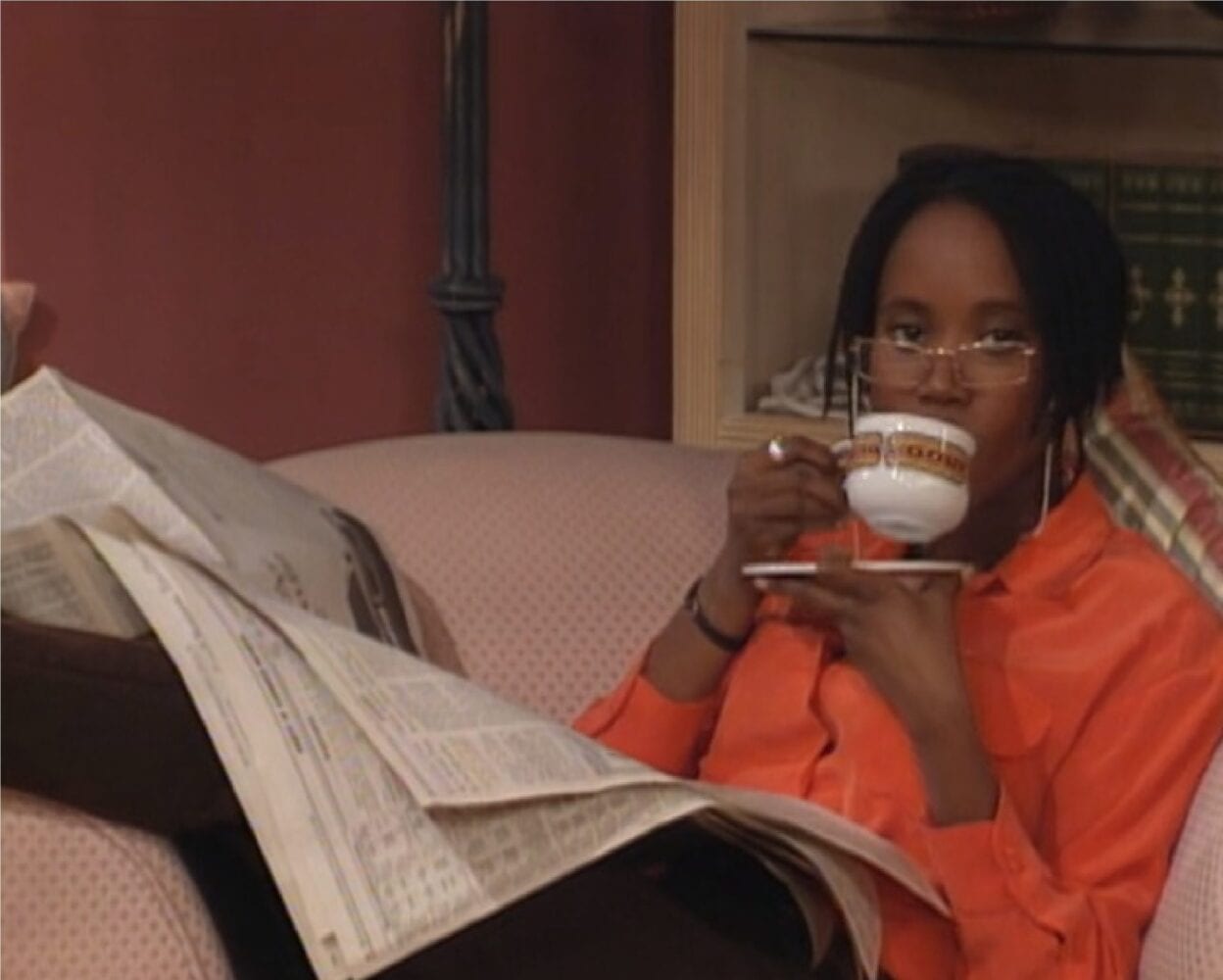
Paula: Maxine Shaw—full name, because she deserves it. She is…aggressive, confident, direct, blunt as a hammer, and wonderfully, gorgeously unapologetic about everything. Up to and especially her sexual career. She has sex. Whenever, wherever, and with whomever she likes. She does not apologize for it, or get bogged down in the idea that she has to maintain some level of purity for the sake of her reputation, or for God. She is never referred to as a slut, she is never made a cautionary tale. When she has a pregnancy scare, her answer to it is not “never having sex again,” it’s “that was a close one. You know better than that. Be more careful next time.” The End.
When she found out her BFF was marrying a woman, there was no big fight about her being gay. It was about her not being told about it, being the last to know. She never apologizes for being successful, for being a woman who doesn’t play coquettish games to get a man, and she never ever apologizes for her Blackness. From the hair to the walk, she is in your face, and if you don’t like it, that’s your problem. That character inspired women like Stacey Abrams! I mean…as an actor, Erika Alexander’s character had delivery, timing, this fantastic devilish twinkle in her eye. Any opportunity to start trouble, or get into an argument, she relished. And can we please appreciate the physical comedy this woman could do? Please.
That’s just discussing the women. But I would love to talk about the show as a whole, about its place in Black culture. There was a lack of heavy “very special” episodes, and I’m pretty sure that was on purpose. But they did address some issues, albeit in a neat little 30 minute package. Like, before that one episode with Khadijah, it was a long-standing in-joke that Black people didn’t GO to therapy. The community, in general, would see it as something strictly for rich, white people. It’s a stigma that has put pressure on people to deal with issues they’re not equipped to deal with. Basically, if you had a serious bout of depression or something, you were expected to just pray about it, and press on. But seeing it there made it more accessible.
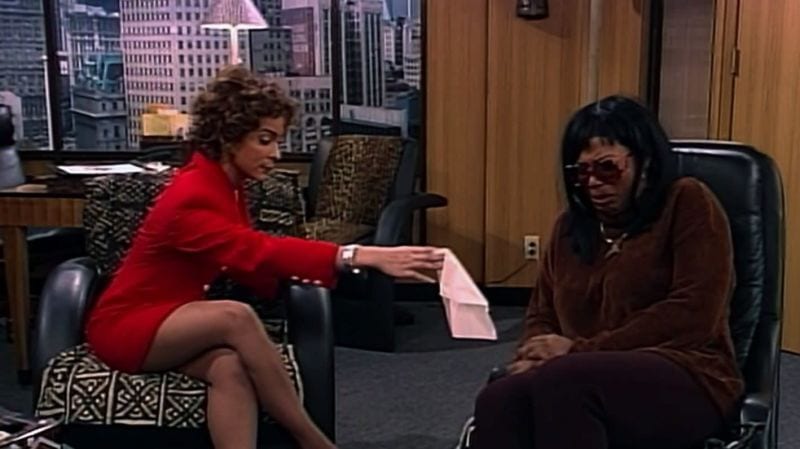
Cat: That episode with Khadijah made me think of the One Day at a Time episode where they addressed the similar stigma among Latinx, how to go to therapy or to take meds for something like anxiety or PTSD is seen as a sign of weakness, as opposed to the legitimate medical problem that it is. I could relate there too, since I resisted getting help for my own things for a very long time, cultural norms or not. It was helpful and relatable to see these super capable women making themselves vulnerable, overcoming societal stigmas and ultimately realising that this makes them stronger, not weaker. Khadijah especially was always such a superwoman that I loved those times we got to see her stumble, not because I liked seeing her suffer, but because she always managed to pick herself up again. It’s so beautifully human. And she did it with humour and grace, and she let her friends help her, which is something some strong women never learn to do—they are so busy being strong that they never learn how to let others in. She’s a wonderful role model.
Paula: We can talk about the relationships of the brothers too. How they relate to the women, and each other. There’s arrogance and some sexist attitudes from Kyle and stuff, but it never crossed over into toxic masculinity. And it’s part of Kyle’s journey too. And the guys show respect and love for each other. Overton…Lord have mercy. That example of a relationship between him and Synclaire…that’s one for the books.
Cat: I love the men too. I love Kyle and Overton’s relationship, and I love the way they related to the women (that S1 episode where Kyle’s boss called them bitches, and Kyle was not having it). Also, let’s be real—I love how they kept finding excuses to let TC Carson sing. That will make any good thing even better. And can I please have all his suits? I also got such a kick out of the times the show went unapologetically meta, but in a subtle, easter-eggy kind of way. We didn’t see the inside of Khadijah’s bedroom a lot, but when we did, there happened to be a Queen Latifah poster on the wall. And in that S1 episode I mentioned, the end credits are done to her U.N.I.T.Y. video. At one point, a reference is made to Tootie with Kim Fields in the room, and later, when Mel Jackson joined the cast, someone says something about Big Mama (he was in Soul Food, which you should see if you haven’t done).
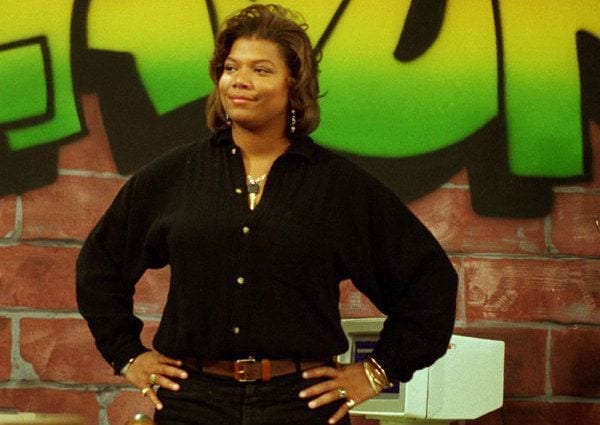
CK Browne: While my friends watched Friends, I went in the other room to watch Living Single. I watched people who were like the people I knew. Professionals who didn’t fit the stereotype usually portrayed through white eyes. I think it’s important to state how the show appeals to more than just its demographic. It’s with crossover appeal that more shows gain traction. Don’t think of it as something that belongs to the Black community. Does it highlight us? Yes. But it’s still human stories, of love, loss, humor, anger. Things that are not solely based on ethnicity. You should look up to and like and admire any damn person you want, ’cause they inspire you to new heights—I don’t give a sh*t how much melanin is in their skin. It’s about the character of a person. Don’t you EVER let someone tell you otherwise!
Would Living Single have gotten more than the five seasons it did if it had gotten the push behind it that Friends got? Would the two shows have been able to peacefully coexist? Would it still have been cancelled? I personally think it could have run forever. I loathe the idea of “welp, we’ve got the more successful show with the white cast, so we don’t need this one anymore” being the reason Living Single got cancelled, but all signs kind of point to Rome, don’t you think? You might have noticed the recent Twitter kerfuffle prompted by David Schwimmer, which points more and more fingers to the belief that Friends was simply a direct rip-off of Living Single, redone with white people.
TC Carson came out recently explaining Kyle’s disappearance from the show, which I’d never really known. He said he was fired for calling out Warner Bros. for over and over again treating his cast shabbily, while Friends got everything. I’m sure that had to have been a body blow to the show, aside from Kyle having always been one of my favourites. The potential good news is that Queen Latifah has been talking about a reboot of some kind, and I would love that SO much. And while we’re waiting for that—Living Single is on Hulu. Like Queen Latifah says in the opening credits, do yourself a favour and check-check-check it out some time. You won’t be sorry.


I was a pre-teen when the show first came out, but I fondly remember watching it and singing along with the theme song every time. “Liiiiiving siiingggle… in a 90’s kind of wooorld, I’m glad I got my girls!”